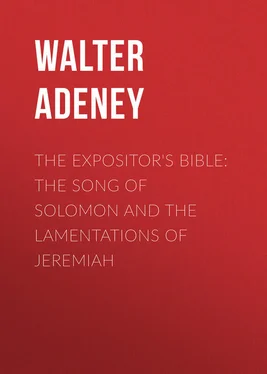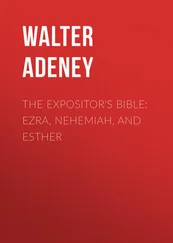Walter Adeney - The Expositor's Bible - The Song of Solomon and the Lamentations of Jeremiah
Здесь есть возможность читать онлайн «Walter Adeney - The Expositor's Bible - The Song of Solomon and the Lamentations of Jeremiah» — ознакомительный отрывок электронной книги совершенно бесплатно, а после прочтения отрывка купить полную версию. В некоторых случаях можно слушать аудио, скачать через торрент в формате fb2 и присутствует краткое содержание. Издательство: Иностранный паблик, Жанр: foreign_religion, foreign_antique, foreign_prose, на английском языке. Описание произведения, (предисловие) а так же отзывы посетителей доступны на портале библиотеки ЛибКат.
- Название:The Expositor's Bible: The Song of Solomon and the Lamentations of Jeremiah
- Автор:
- Издательство:Иностранный паблик
- Жанр:
- Год:неизвестен
- ISBN:нет данных
- Рейтинг книги:3 / 5. Голосов: 1
-
Избранное:Добавить в избранное
- Отзывы:
-
Ваша оценка:
- 60
- 1
- 2
- 3
- 4
- 5
The Expositor's Bible: The Song of Solomon and the Lamentations of Jeremiah: краткое содержание, описание и аннотация
Предлагаем к чтению аннотацию, описание, краткое содержание или предисловие (зависит от того, что написал сам автор книги «The Expositor's Bible: The Song of Solomon and the Lamentations of Jeremiah»). Если вы не нашли необходимую информацию о книге — напишите в комментариях, мы постараемся отыскать её.
The Expositor's Bible: The Song of Solomon and the Lamentations of Jeremiah — читать онлайн ознакомительный отрывок
Ниже представлен текст книги, разбитый по страницам. Система сохранения места последней прочитанной страницы, позволяет с удобством читать онлайн бесплатно книгу «The Expositor's Bible: The Song of Solomon and the Lamentations of Jeremiah», без необходимости каждый раз заново искать на чём Вы остановились. Поставьте закладку, и сможете в любой момент перейти на страницу, на которой закончили чтение.
Интервал:
Закладка:
The vigour, one might say the rigour, of this passage distinguishes it from nearly all other poetry devoted to the praises of love. That poetry is usually soft and tender; sometimes it is feeble and sugary. And yet it must be remembered that even the classical Aphrodite could be terribly angry. There is nothing morbid or sentimental in the Shulammite's ideas. She has discovered and proved by experience that love is a mighty force, capable of heroic endurance, and able, when wronged, to avenge itself with serious effect.
Towards the conclusion of the poem fresh speakers appear in the persons of the Shulammite's brothers, who defend themselves from the charge of negligence in having permitted their little sister to be snatched away from their keeping, explaining how they have done their best to guard her. Or perhaps they mean that they will be more careful in protecting a younger sister. They will build battlements about her. The Shulammite takes up the metaphor. She is safe now, as a wall well embattled; at last she has found peace in the love of her husband. Solomon may have a vineyard in her neighbourhood, and draw great wealth from it with which to buy the wares in which he delights. 73 73 viii. 11.
It is nothing to her. She has her own vineyard. This reference to the Shulammite's vineyard recalls the mention of it at the beginning of the poem, and suggests the idea that in both cases the image represents the shepherd lover. In the first instance she had not kept her vineyard, 74 74 i. 6.
for she had lost her lover. Now she has him, and she is satisfied. 75 75 viii. 12.
He calls to her in the garden, longing to hear her voice there, 76 76 viii. 13.
and she replies, bidding him hasten and come to her as she has described him coming before, —
"Like to a roe or a young hart
Upon the mountains of spices." 77 77 viii. 14.
And so the poem sinks to rest in the happy picture of the union of the two young lovers.
CHAPTER IV
MYSTICAL INTERPRETATIONS
Thus far we have been considering the bare, literal sense of the text. It cannot be denied that, if only to lead up to the metaphorical significance of the words employed, those words must be approached through their primary physical meanings. This is essential even to the understanding of pure allegory such as that of The Faerie Queen and The Pilgrim's Progress ; we must understand the adventures of the Red Cross Knight and the course of Christian's journey before we can learn the moral of Spenser's and Bunyan's elaborate allegories. Similarly it is absolutely necessary for us to have some idea of the movement of the Song of Solomon as a piece of literature, in its external form, even if we are persuaded that beneath this sensuous exterior it contains the most profound ideas, before we can discover any such ideas. In other words, if it is to be considered as a mass of symbolism the symbols must be understood in themselves before their significance can be drawn out of them.
But now we are confronted with the question whether the book has any other meaning than that which meets the eye. The answers to this question are given on three distinct lines: – First, we have the allegorical schemes of interpretation, according to which the poem is not to be taken literally at all, but is to be regarded as a purely metaphorical representation of national or Church history, philosophical ideas, or spiritual experiences. In the second place, we meet with various forms of double interpretation, described as typical or mystical , in which a primary meaning is allowed to the book as a sort of drama or idyl, or as a collection of Jewish love-songs, while a secondary signification of an ideal or spiritual character is added. Distinct as these lines of interpretation are in themselves, they tend to blend in practice, because even when two meanings are admitted the symbolical signification is considered to be of so much greater importance than the literal that it virtually occupies the whole field. In the third place there is the purely literal interpretation, that which denies the existence of any symbolical or mystical intention in the poem.
Allegorical interpretations of the Song of Solomon are found among the Jews early in the Christian era. The Aramaic Targum, probably originating about the sixth century A.D., takes the first half of the poem as a symbolical picture of the history of Israel previous to the captivity, and the second as a prophetic picture of the subsequent fortunes of the nation. The recurrence of the expression "the congregation of Israel" in this paraphrase wherever the Shulammite appears, and other similar adaptations, entirely destroy the fine poetic flavour of the work, and convert it into a dreary, dry-as-dust composition.
Symbolical interpretations were very popular among Christian Fathers – though not with universal approval, as the protest of Theodore of Mopsuestia testifies. The great Alexandrian Origen is the founder and patron of this method of interpreting the Song of Solomon in the Church. Jerome was of opinion that Origen "surpassed himself" in his commentary on the poem – a commentary to which he devoted ten volumes. According to his view, it was originally an epithalamium celebrating the marriage of Solomon with Pharaoh's daughter; but it has secondary mystical meanings descriptive of the relation of the Redeemer to the Church or the individual soul. Thus "the little foxes that spoil the grapes" are evil thoughts in the individual, or heretics in the Church. Gregory the Great contributes a commentary of no lasting interest. Very different is the work of the great mediæval monk St. Bernard of Clairvaux, who threw himself into it with all the passion and rapture of his enthusiastic soul, and in the course of eighty-six homilies only reached the beginning of the third chapter in this to him inexhaustible mine of spiritual wealth, when he died, handing on the task to his faithful disciple Gilbert Porretanus, who continued it on the same portentous scale, and also died before he had finished the fifth chapter. Even while reading the old monkish Latin in this late age we cannot fail to feel the glowing devotion that inspires it. Bernard is addressing his monks, to whom he says he need not give the milk for babes, and whom he exhorts to prepare their throats not for this milk but for bread. As a schoolman he cannot escape from metaphysical subtleties – he takes the kiss of the bridegroom as a symbol of the incarnation. But throughout there burns the perfect rapture of love to Jesus Christ which inspires his well-known hymns. Here we are at the secret of the extraordinary popularity of mystical interpretations of the Song of Solomon. It has seemed to many in all ages of the Christian Church to afford the best expression for the deepest spiritual relations of Christ and His people. Nevertheless, the mystical method has been widely disputed since the time of the Reformation. Luther complains of the "many wild and monstrous interpretations" that are attached to the Song of Solomon, though even he understands it as symbolical of Solomon and his state. Still, not a few of the most popular hymns of our own day are saturated with ideas and phrases gathered from this book, and fresh expositions of what are considered to be its spiritual lessons may still be met with.
It is not easy to discover any justification for the rabbinical explanation of the Song of Solomon as a representation of successive events in the history of Israel, an explanation which Jewish scholars have abandoned in favour of simple literalism. But the mystical view, according to which the poem sets forth spiritual ideas, has pleas urged in its favour that demand some consideration. We are reminded of the analogy of Oriental literature, which delights in parable to an extent unknown in the West. Works of a kindred nature are produced in which an allegorical signification is plainly intended. Thus the Hindoo Gilagovinda celebrates the loves of Chrishna and Radha in verses that bear a remarkable resemblance to the Song of Solomon. Arabian poets sing of the love of Joseph for Zuleikha, which mystics take as the love of God towards the soul that longs for union with Him. There is a Turkish mystical commentary on the Song of Hafiz.
Читать дальшеИнтервал:
Закладка:
Похожие книги на «The Expositor's Bible: The Song of Solomon and the Lamentations of Jeremiah»
Представляем Вашему вниманию похожие книги на «The Expositor's Bible: The Song of Solomon and the Lamentations of Jeremiah» списком для выбора. Мы отобрали схожую по названию и смыслу литературу в надежде предоставить читателям больше вариантов отыскать новые, интересные, ещё непрочитанные произведения.
Обсуждение, отзывы о книге «The Expositor's Bible: The Song of Solomon and the Lamentations of Jeremiah» и просто собственные мнения читателей. Оставьте ваши комментарии, напишите, что Вы думаете о произведении, его смысле или главных героях. Укажите что конкретно понравилось, а что нет, и почему Вы так считаете.












